Environmental and Biomaterial Sciences
The doctoral programme educates interdisciplinary experts in the physical-chemical properties of materials and biology. It covers areas such as materials and environmental sciences, circular chemistry, biotechnology, and sustainable approaches.
Why did you choose EnviBio for the study?
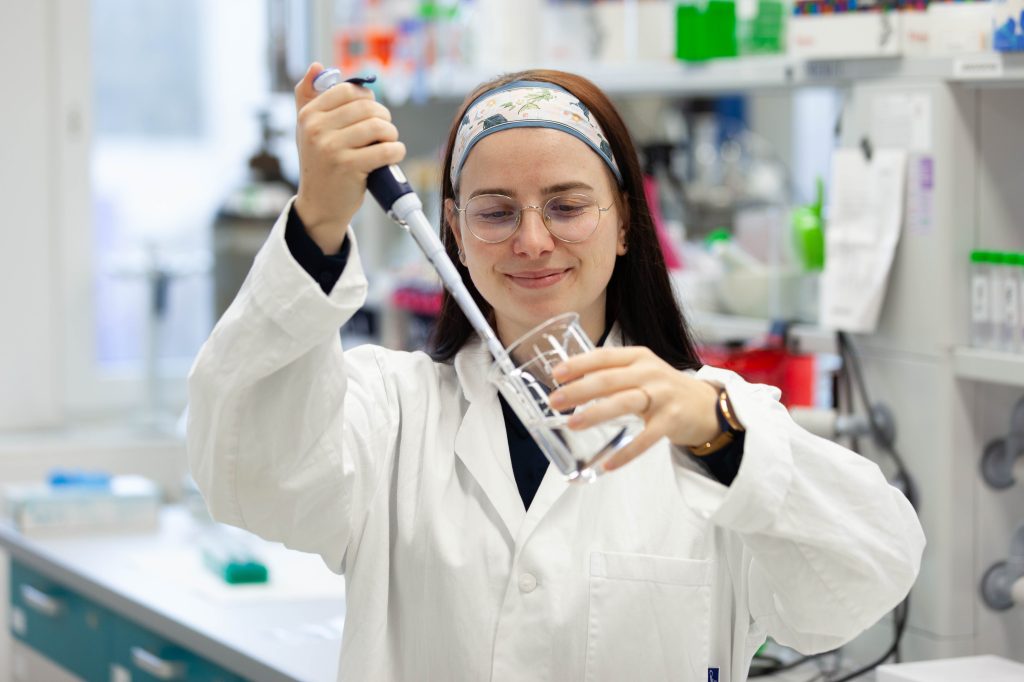
Ever since I was very young, I have wanted to pursue a PhD in biology (later, biotechnology) and increase my knowledge to contribute to meaningful research and inspire young students to follow their passion. The future holds many challenges and thus possibilities for us to achieve something meaningful. I am grateful that I get to investigate the world of cells on the molecular level and show how something, which might be easily overlooked, can have a huge influence later on. 😉 Lisa
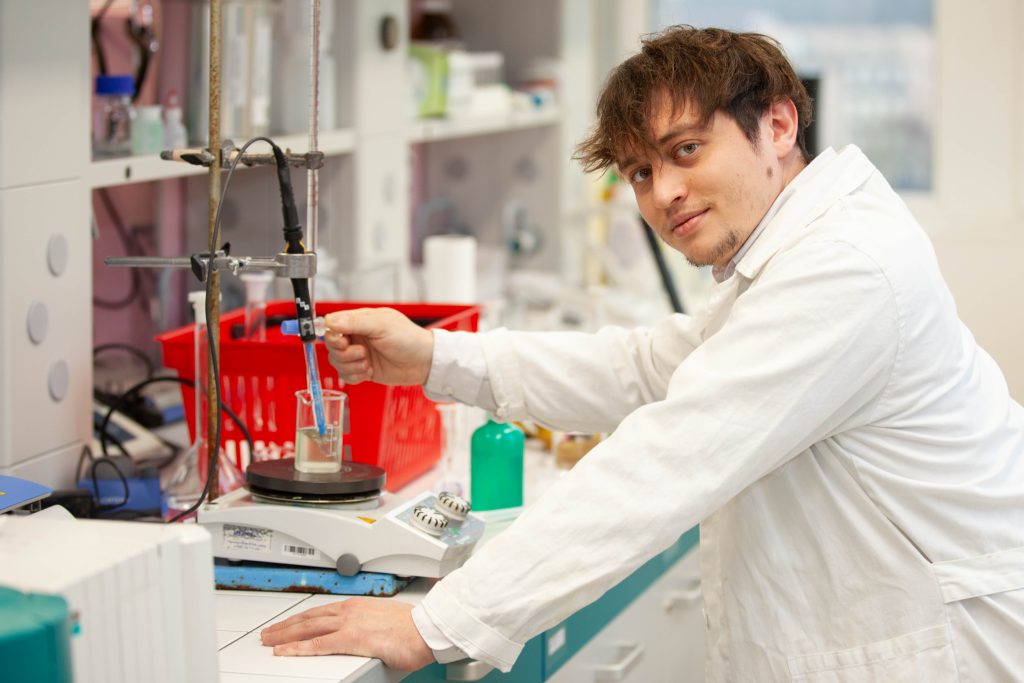
Being a researcher in Dresden with the motto “Science should not have borders,” I see the Environmental and Biomaterial Sciences program as a perfect opportunity not only to deepen my knowledge of biomaterial synthesis and applications, but also to strengthen scientific and industrial collaboration between Germany and the Czech Republic.
I strongly believe that the ideas and expertise contributed by students of this program, under the careful supervision of senior scientists, will play an important role in realizing the potential of biomaterial-based technologies for sustainable development and practical solutions.
Being part of this process makes me both happy and proud.” Alexander
ABOUT THE DOCTORAL PROGRAMME
Newly opened for the academic year 2024/2025
The doctoral programme “Environmental and Biomaterial Sciences” is a joint accreditation between:
- Faculty of Environment (main coordinator) UJEP (FZP)
- Faculty of Science UJEP (PrF)
- Institute of Inorganic Chemistry of the Czech Academy of Sciences, Prague (IIC)
The programme is realized in partnership with:
- Fraunhofer Institute for Ceramic Technologies and Systems IKTS, Dresden, Germany
Specialized laboratories and mentoring are provided by:
Information about courses
A. COMPULSORY COURSES
B. COMPULSORY OPTIONAL COURSES
C. SPECIALIZED LABORATORIES AND PRACTICALS
D. OPTIONAL COURSES
DETAIL DESCRIPTION
The goal of the doctoral programme EnviBio is to educate experts with deep interdisciplinary knowledge at the boundaries of the physical-chemical properties of materials and biology, in selected modules, according to the individualization of the students, including areas of environmental, analytical chemistry and biochemistry, chemistry and physics of materials, biomaterials, green technologies, circular economy, sustainable technologies, functional and progressive materials.
During their studies, students will become acquainted with the latest characterization techniques and work in “high-tech” laboratories, for example, in the environment of a clean room laboratory, or in an accredited laboratory, as well as with advanced syntheses of new materials or application-oriented characterization laboratories, or material screening. Graduates of EnviBio should be able to design new materials with regard to the required physical-chemical properties in correlation with their atomic-molecular structure, with a deep understanding of the interaction of these materials with the environment (environmental, medical, etc. applications).
When developing materials and possible devices, graduates will also take into account products entire life cycle, especially with regard to potential secondary use or recycling. Mastery of a multi-disciplinary approach and the use of synergistic effects in problem-solving is expected, which will be achieved thanks to the interdisciplinary cooperation of FZP, PrF, IIC and a foreign partner institution, IKTS. Thanks to the involvement of foreign teachers and a foreign partner institution in teaching and specialized laboratories, students will learn to work, think and procedures in an international scientific atmosphere, i.e., in a competitive environment. In cooperation with IKTS, students will learn the approach to commercialization, i.e., procedures and methodology for transferring laboratory technologies and new materials into usable practice and their positive impact on the economy – a skill that is currently highly important for improving the competitiveness of the Czech Republic and EU.
The aim of the study is to prepare new generations of experts who will continue either in the academic environment and in the future take over the roles of creative and leading workers in new fields, or in research and development departments of innovative and creative international companies – “market leaders” – both in the Czech environment, but naturally also abroad, e.g., in Saxony, Germany (represented by a partner institution IKTS), which is becoming a Western European technological “Silicon Valley”.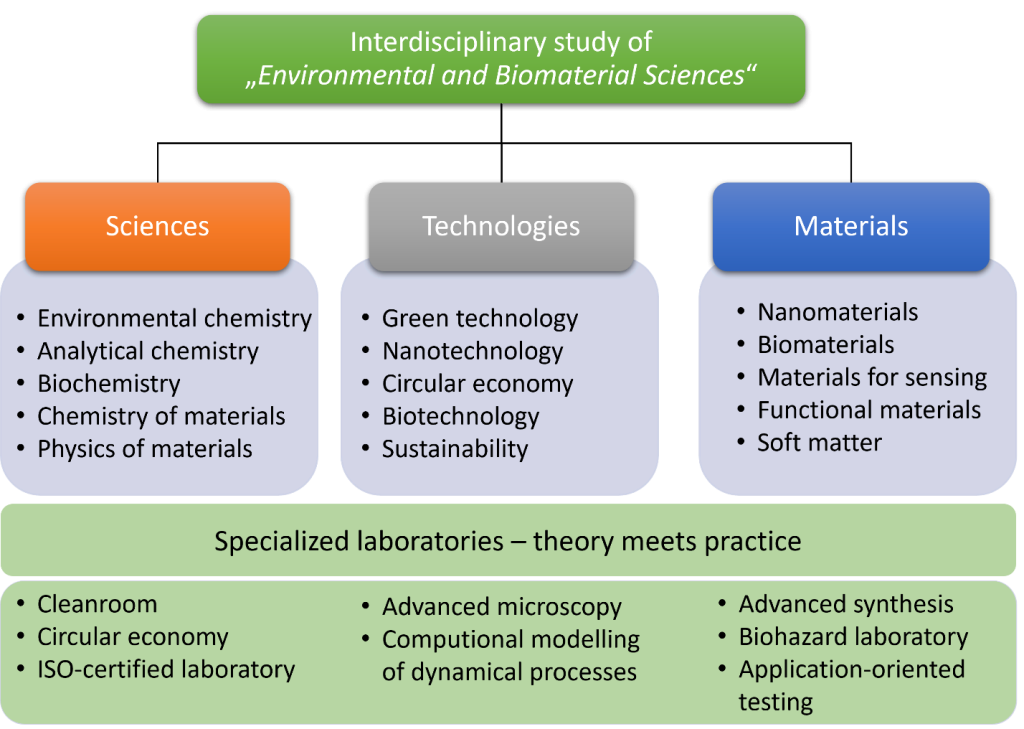
KEY COMPETENCES ACQUAINTED
Knowledge: A graduate of the doctoral study program “Environmental and Biomaterial Sciences” have deep knowledge, according to the individualization of their study courses, in the fields of environmental, analytical chemistry and biochemistry, materials chemistry, biomaterials, sustainable approaches, technologies, circular economy, functional materials, and biotechnologies. They are well-oriented in related scientific disciplines and can communicate with specialists from other fields and experts from industry at an appropriate level.
Practical knowledge and skills: Students master the methods of studying various materials and procedures for their application in the field of environmental protection and human health. They understand the relationships between the structure of materials and their macroscopic or useful properties and can use this when developing functional (functionalized) materials, including materials for biomedical applications. Students master the principles of modern physical-chemical methods for characterizing materials, their possibilities and limitations, and can practically use them when designing new materials.
Competencies and abilities: Students are prepared to work with modern technology in specialised laboratories and workplaces with a special regime (e.g., clean rooms, biological hazard laboratories, etc.). The education of the students is multidisciplinary in all respects – emphasis is placed on the ability of complex and “outside-the-box” thinking across the boundaries of scientific disciplines covered within the study. The graduates are familiar with the methods of scientific work. They are prepared, for example, to independently carry out research and development in the field of new functional materials for environmental protection, sustainable technologies, biomaterials, circular economy, nanotechnologies, and others at the level of the current state of knowledge with regard to practical usability.
An important aspect of the study is the systematic preparation of the students for the ability to work in a team in an international environment so that they can become leaders of such teams in the future.
Part of the study will also involve developing soft skills, such as communication skills, the ability to present and prepare qualified professional documents, the ability to clearly formulate thoughts, and the ability to apply for funding, such as EU funding, thus increasing the Czech Republic’s and the EU’s competitiveness in the R&D area.
APPLICATION & IMPORTANT DATES
Conditions for admission to study for the academic year 2026/2027
Application supplement for the doctoral programme
Deadline for submission of applications May 31, 2026
Please contact the chair of the doctoral programme or potential supervisor to obtain further information.
EVENTS
13.-14. October 2025 – European School for young scientists
DOCTORAL COUNCIL
OUR VISION
The Doctoral Council envisions a future where every doctoral student is empowered, inspired, and well-equipped to reach their full potential. Our mission is to provide a robust support and evaluation system that not only fosters intellectual growth and nurtures academic curiosity but also promotes personal development. We are committed to offering a range of support, including guidance and resources tailored to the unique needs of each student. Our dedicated team of experienced professionals is always ready to assist, whether it is navigating the complexities of research, overcoming academic challenges, or planning for a successful career post-graduation. We believe in the power of collaboration, the importance of community, and the value of each individual’s contribution to the world of academia. As a part of our council, students can expect a supportive, enriching, and motivational environment that champions their ambitions and celebrates their achievements. Together, we are shaping the leaders, innovators, and thinkers of tomorrow.
MEMBERS
Chair
doc. Ing. Jiří Orava, Ph.D. (guarantor of Environmental and Biomaterial Sciences, Faculty of Environment UJEP)
Vice-chairs
Ing. Kamil Lang, CSc., DSc. (Institute of Inorganic Chemistry, Czech Academy of Sciences)
Mgr. Jan Malý, Ph.D. (Faculty of Science UJEP)
Members
doc. RNDr. Pavla Bojarová, Ph.D. (Institute of Microbiology, Czech Academy of Sciences; Faculty of Biomedical Engineering CTU in Prague)
RNDr. Jan Demel, Ph.D. (Institute of Inorganic Chemistry, Czech Academy of Sciences)
prof. RNDr. Milan Gryndler, CSc. (Faculty of Science UJEP)
doc. Ing. Jiří Henych, Ph.D. (Faculty of Science UJEP)
prof. Mgr. Martin Hrubý, Ph.D., DSc. (First Faculty of Medicine, Charles University; Institute of Macromolecular Chemistry, Czech Academy of Sciences)
Mgr. Olga Šebestová Janoušková, Ph.D. (Faculty of Science UJEP)
doc. Dr. Ing. Pavel Kuráň (Faculty of Environment UJEP)
Dr. rer. nat. Jörg Opitz (Fraunhofer Institute for Ceramic Technologies and Systems IKTS, Dresden, Germany; BIOTEC and Max-Bergmann-Center of Biomaterials, TU Dresden, Germany)
Ing. Štěpán Stehlík, Ph.D. (New Technologies Research Centre, University of West Bohemia; Institute of Physics, Czech Academy of Sciences)
doc. MUDr. Petr Vachata, Ph.D. MBA (Neurosurgery Clinic, Masaryk Hospital in Usti nad Labem)
Ing. Stanislav Vinopal, Ph.D. (Faculty of Science UJEP)
prof. Ing. Tomáš Wágner, DrSc. (Faculty of Chemical Technology, University of Pardubice)
prof. Spyros N. Yannopoulos (Foundation of Research and Technology Hellas, Institute of Chemical Engineering Sciences, Patras, Greece)
Secretary
Ing. Daniel Bůžek, Ph.D. (Faculty of Science UJEP)
SUGGESTED RESEARCH AREAS
The following list outlines suggested research areas, with potential supervisors listed in parentheses. These are indicative themes only, not pre-approved titles. Applicants are required to contact the listed supervisor to refine and finalize their topic before applying. We also welcome applicants to propose their own research topics to relevant supervisors
CHEMISTRY AND PHYSICS OF MATERIALS
Cationic boranes as catalysts and molecular sensors
(supervisor: RNDr. Karel Škoch, Ph.D., Institute of Inorganic Chemistry, Czech Academy of Sciences, Prague)
Metal-organic frameworks (MOFs) as protonic conducting materials
(supervisor: Mgr. Jan Hynek, Ph.D., Institute of Inorganic Chemistry, Czech Academy of Sciences, Prague)
Molecular clusters and their photophysical (luminescent) or antibacterial properties
(supervisor: Ing. Kamil Lang, CSc., DSc., Institute of Inorganic Chemistry, Czech Academy of Sciences, Prague)
Activated boranes as new perspective porous materials – Synthesis and environmental or catalytical application (supervisor: RNDr. Jan Demel, Ph.D., Institute of Inorganic Chemistry, Czech Academy of Sciences, Prague)
Phosphine-ligand-based metal-organic frameworks – a new class of materials for environmental applications
(supervisor: RNDr. Jan Demel, Ph.D., Institute of Inorganic Chemistry, Czech Academy of Sciences, Prague)
Stability of porous materials
(supervisor: Ing. Daniel Bůžek, Ph.D., Faculty of Environment UJEP; co-supervisor: RNDr. Jan Demel, Ph.D., Institute of Inorganic Chemistry, Czech Academy of Sciences, Prague)
A multiscale approach to characterize transport in porous structures (supervisor: doc. Ing. Jaromír Havlica, Ph.D., Faculty of Science UJEP)
BIOMATERIALS AND DRUG DELIVERY
Exosome-nanofiber materials for cosmetic applications
(supervisor: doc. Ing. Jiri Orava, Ph.D., Faculty of Environment, UJEP; co-supervisors: Mgr. Jan Malý, Ph.D., Faculty of Science UJEP, and Dr. Jörg Opitz, Fraunhofer Institute for Ceramic Technologies and Systems IKTS, Dresden, Germany)
Exploitation of extracellular vesicles as drug delivery natural nanotherapeutics
(supervisor: Mgr. Olga Janoušková Šebestová, Ph.D., Faculty of Science, UJEP; co-supervisor: Mgr. Jan Malý, Ph.D., Faculty of Science UJEP)
Isolation and characterization of exosomes from unconventional non-mammalian sources for biotechnological applications
(supervisor: Mgr. Jan Malý, Ph.D., Faculty of Science, UJEP; co-supervisor: Mgr. Olga Janoušková Šebestová, Ph.D., Faculty of Science UJEP)
Effect of organic nanoparticles on the microbial component of biofilms
(supervisor: prof. RNDr. Milan Gryndler, CSc., Faculty of Science, UJEP)
An in-depth investigation of nanoparticle interactions with diverse lipid model membranes
(supervisor: Dominika Wrobel, MSc, Ph.D., Faculty of Science, UJEP)
Functional characterization of neuron-specific alternatively-spliced isoforms of selected cytoskeletal proteins
(supervisor: Ing. Stanislav Vinopal, Ph.D., Faculty of Science, UJEP)
Rearrangements of cellular cytoskeleton under stress
(supervisor: Ing. Stanislav Vinopal, Ph.D., Faculty of Science, UJEP)
Sustainable Approaches in the Synthesis of Pharmaceutical Compounds
(supervisor: Ing. Martin Babor, Ph.D., Faculty of Science, UJEP)
MATERIALS FOR DIAGNOSTIC AND MICROFLUIDIC APPLICATIONS
Intercellular communication of cancer stem cells and their influence on cancer progression (supervisor: Mgr. Olga Janoušková Šebestová, Ph.D., Faculty of Science, UJEP)
Exploring dendritic polymers as promising nanotherapeutics for the treatment of cancer-derived extracellular nanovesicles
(supervisor: Mgr. Olga Janoušková Šebestová, Ph.D., Faculty of Science, UJEP; co-supervisor: Dominika Wrobel, MSc, Ph.D., Faculty of Science UJEP)
The role of the cytoskeleton in cryptobiotic morphological transformations in Tardigrada
(supervisor: Ing. Stanislav Vinopal, Ph.D., Faculty of Science, UJEP)
Microfluidic devices for analysis of direct communications between cancer cells mediated by tunnelling nanotubes
(supervisor: Mgr. Jan Malý, Ph.D., Faculty of Science, UJEP; co-supervisor: Ing. Stanislav Vinopal, Ph.D., Faculty of Science UJEP)
Development of microfluidic devices for simulating the blood-brain tumour barrier (BBTB)
(supervisor: Mgr. Jan Malý, Ph.D., Faculty of Science, UJEP; co-supervisor: Mgr. Marcel Štofik, Ph.D., Faculty of Science UJEP)
Advanced plasmonic microfluidic chips for the detection of cancer-derived exosomes
(supervisor: Mgr. Jan Malý, Ph.D., Faculty of Science, UJEP; co-supervisor: Mgr. Marcel Štofik, Ph.D., Faculty of Science UJEP)
ENVIRONMENTAL CHEMISTRY AND CIRCULAR ECONOMY
Materials approach to the safety management of Li-ion batteries (supervisor: doc. Ing. Jiri Orava, Ph.D., Faculty of Environment, UJEP)
Materials for environmental energy harvesting
(supervisor: doc. Ing. Jiří Orava, Ph.D., Faculty of Environment, UJEP; co-supervisor: Prof. Spyros N. Yannopoulos, Foundation of Research and Technology Hellas, Institute of Chemical Engineering Sciences, Patras, Greece)
Heat transfer in granular layers: The influence of mixing
(supervisor: doc. Ing. Jaromír Havlica, Ph.D., Faculty of Science UJEP)
Dynamical behaviour of granular materials: From dry systems to suspensions
(supervisor: doc. Ing. Jaromír Havlica, Ph.D., Faculty of Science UJEP)
Recovering critical raw materials from lithium-ion batteries
(supervisor: doc. Ing. Jiří Orava, Ph.D., co-supervisor: Ing. Jiří Štojdl, Faculty of Environment UJEP)
Polydispersity and its impact on the dynamic behaviour of granular materials
(supervisor: doc. Ing. Jaromír Havlica, Ph.D., Faculty of Science UJEP)
Chemical recycling of textile materials
(supervisor: doc. Dr. Ing. Pavel Kuráň, co-supervisor: Dr. Lucie Oravová, Faculty of Environment UJEP)
Nanodiamonds as nanoparticle surfactants for environmental applications
(supervisor: Ing. Štěpán Stehlík, Institute of Physics of the Czech Academy of Sciences, Prague; co- supervisor: doc. Ing. Jiří Orava, Ph.D., Faculty of Environment UJEP)
Electrically conductive diamond structures for environmental applications
(supervisor: prof. Ing. Alexander Kromka, DrSc., Institute of Physics of the Czech Academy of Sciences, Prague; co-supervisor: doc. Ing. Jiří Orava, Ph.D., Faculty of Environment UJEP)
Photoactive nanocomposite materials based on molybdenum clusters and functional nanoparticles
(supervisor: doc. Ing. Jiří Henych, Ph.D., Faculty of Environment UJEP and Institute of Physics of the Czech Academy of Sciences, Prague; consultant: PhDr. Kaplan Kirakci, Ph.D., Institute of Physics of the Czech Academy of Sciences, Prague)
Properties and environmental impact of rejuvenated polymer-modified asphalt
(supervisor: doc. Ing. Jiří Orava, Ph.D., Faculty of Environment UJEP; co-supervisor: doc. Dr. Ing. Pavel Kuráň, Faculty of Environment UJEP; consultant: Quintilio-Thomas Falvo, BASF SE, Ludwigshafen, Germany)
Application of Electrospun Structures as Microbial Inoculants Carriers for Agricultural Purposese in Europe (Opitz)
IMPORTANT DOCUMENTS
- Study and examination rules for doctoral study programmes
- Scholarship regulations
- Disciplinary code
- The organisation of studies in the joint doctoral programme Environmental and Biomaterial Sciences of the Faculty of Environment, Faculty of Science – Jan Evangelista Purkyně University in Ústí nad Labem and the Institute of Inorganic Chemistry of the Czech Academy of Sciences in cooperation with the Fraunhofer Institute for Ceramic Technologies and Systems Germany
- Annual Evaluation of the Individual Study Plan of a Doctoral Programme in the Academic Year
- Individual Study Plan of a Doctoral Programme – Framework layout of the study for the expected period of education
- Individual Study Plan of a Doctoral Programme – A detail study plan for the academic year
- Application for the State Doctoral Examination
- Consent with exam during study vacation period
- Proposal for the provision of a scholarship from the Student Grant Competition project (SGS)
- Proposal for the provision of a scholarship from the Student Grant Competition project (SGS) – bulk
USEFUL LINKS
USEFUL AI TOOLS
Presentation:
https://gamma.app/cs
https://www.perplexity.ai/
Papers writing:
https://notebooklm.google.com/
https://elicit.com/
https://consensus.app/
https://www.semanticscholar.org/
https://www.chatpdf.com/
Text editing:
https://scispace.com/
https://www.hyperwriteai.com/
https://app.jenni.ai/
https://manus.im/
Phd ACADEMY AT UJEP
https://www.ujep.cz/cs/doktorska-akademie
CONTACTS
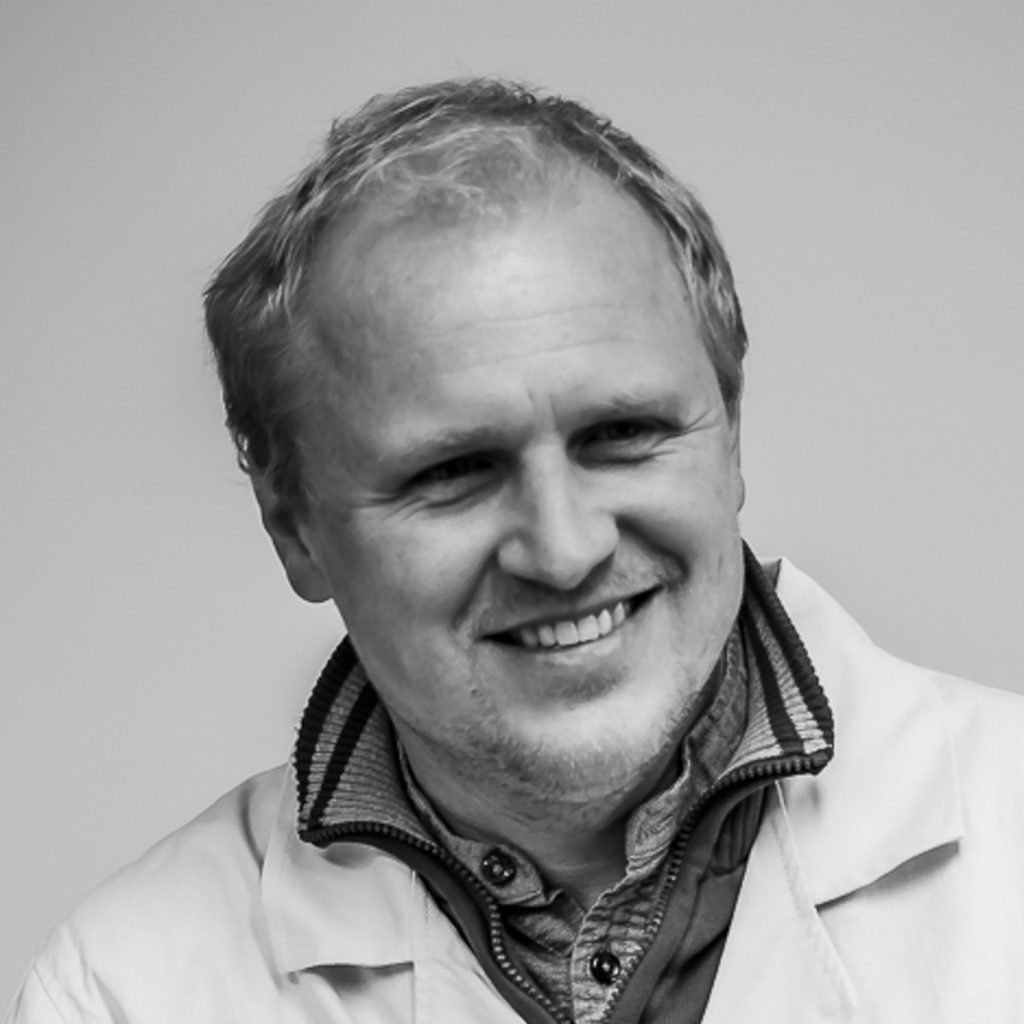
Assoc. Prof. Jiři Orava (programme guarantor and chair of the doctoral council) can provide more information about the doctoral programme.
Faculty of Environment
Jan Evangelista Purkyne University in Usti nad Labem
Pasteurova 3632/15, Usti nad Labem 400 96, Czech Republic
E-mail:

Dr. Daniel Bůžek (programme secretary):


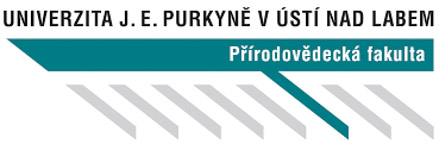
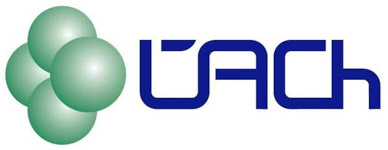

This study programme was prepared within the project NPO_UJEP_MSMT-16588/2022
